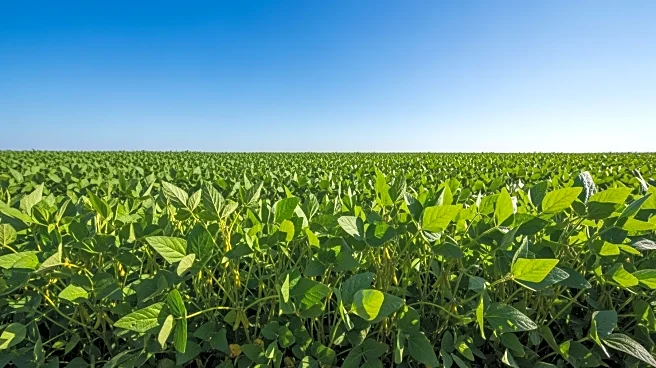What's Happening?
Brazilian farmers are ramping up soybean production in response to the ongoing trade conflict between the U.S. and China. The trade war, initiated by President Trump, has led China to halt imports of American
soybeans, creating an opportunity for Brazilian producers to fill the gap. Brazilian farmer Andrey Rodrigues, along with others, is increasing his soybean output to meet the demand from China, which has been actively seeking alternatives to U.S. soybeans. This shift has resulted in Brazilian soybeans accounting for over 70% of China's imports last year, while the U.S. share has dropped significantly. The Brazilian government reports that 77 million metric tons of soybeans were exported to China between January and August, with expectations for increased production in the coming harvest.
Why It's Important?
The shift in soybean trade dynamics is significant for both U.S. and Brazilian agriculture sectors. For U.S. farmers, the loss of the Chinese market due to retaliatory tariffs has increased the cost of American soybeans, making them less competitive globally. This situation poses a risk to U.S. farmers who may face financial difficulties if they cannot find alternative markets. Conversely, Brazilian farmers are benefiting from increased demand, which could lead to economic growth and expansion in Brazil's agricultural sector. The trade dispute highlights the broader geopolitical tensions between the U.S. and China, affecting global trade patterns and economic relationships.
What's Next?
As the U.S. soybean harvest begins, there is no indication that China will resume purchasing American soybeans. U.S. farmers may need to focus on diversifying their markets and exploring new uses for soybeans domestically, such as biodiesel production. Meanwhile, Brazilian farmers are expected to continue increasing production to meet China's demand. The Brazilian government is reviewing production forecasts, anticipating further growth. The situation may evolve depending on diplomatic negotiations and potential changes in trade policies between the U.S. and China.
Beyond the Headlines
The trade conflict underscores the complexities of international trade and the impact of political decisions on global markets. It raises ethical considerations about the consequences of trade wars on farmers and economies. The situation also highlights the importance of strategic alliances and the role of diplomacy in expanding market access. Brazilian farmers, while benefiting from the current scenario, express concerns about the long-term implications of relying heavily on a single market.









